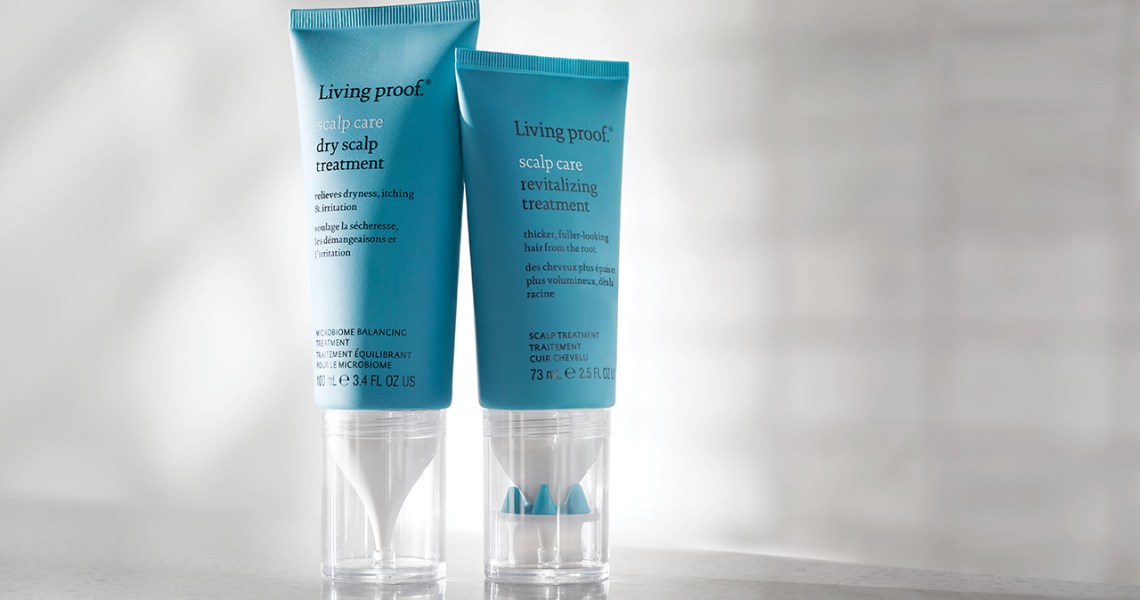With more brands aiming to clean and clarify the scalp, hair care’s buzziest category is getting crowded.
In early March, Living Proof relaunched its existing Dry Scalp Treatment by taking it out of its Restore collection, meant for damaged hair, and moving it to a newly created dedicated scalp collection. Living Proof also launched a new Revitalizing Treatment product within the scalp franchise. Zach Rieken, Living Proof CEO, pointed to self-care as the reason for the growing interest in hair care and, more specifically, scalp care. When Living Proof launched out of MIT in 2005, it was one of the earliest — if not the only — brands to emphasize its science and tech-backed formulas. But there has been more innovation in hair care since and, naturally, more competition. Brands like Virtue Labs, Function of Beauty, Better Not Younger and Olaplex have joined in the science-backed and scalp care chorus.
“The skinification of hair has been a huge trend in beauty for some time. Our take is a twist on that, because we believe that the scalp is unique because it’s not hair and it’s not skin. It actually has its own complex ecosystem,” said Rieken.
Rieken said that Living Proof plans to grow to $200 million in annual revenue over the next four years, fueled by global expansion into Asia and the U.K. Historically, 85% of the brand’s sales have been from North America, he said. Unilever did not disclose in 2016 how much it paid to acquire a 100% stake in Living Proof, but estimates at the time pointed to around $150 million. Living Proof expected to earn $50 million in sales in 2016, according to Financial Times.
Since its 2016 transition to Unilever ownership, Living Proof has been relatively quiet. Jennifer Aniston, the brand’s ambassador and an investor, left the brand following the acquisition. Living Proof does not currently have a brand ambassador, though it worked with celebrity hairstylist Mara Roszak in 2018.
Irena Milev, creative director at creative agency B-Reel, described Living Proof’s current branding and communications strategy as “very corporate.” She said the brand has a sense of monotony to its posts and visuals, but praised its diverse casting of models and hair types.
“Their communication could be more diverse beyond the science,” she said. “The whole approach feels very conservative. When you’re competing in this space with the other kind of shiny new brands, you have to take some cues [and adapt].”
Ad position: web_incontent_pos1
Milev said brands like Crown Affair and Prose do an effective job talking about hair and science-backed products, applying creative visuals and plugging into relevant conversations. Aside from introducing a scalp category, Living Proof also brought back in January a collection of curly and textured hair products, which previously existed from 2015-2018 before it was discontinued. Curly and textured hair care launches increased over the last year, thanks to new brands like Bread Beauty Supply, and additional launches from Briogeo and Curls.
Living Proof does not plan to launch additional scalp products this year, but instead will focus on communications around the new sub-category. Rieken said that the narrative around the scalp collection emphasizes both short-term scalp relief and improved thickness of hair, as well as the long-term benefits around a new proprietary formula for an overall healthier scalp. Living Proof partnered for the first time with a dermatologist, Dr. Joyce Park, to promote the launch and show how these products can help with postpartum hair loss or in conjunction with medicated hair treatments. Living Proof offers a fuller hair franchise, but it appears they were not emphasized in marketing in the wake Covid-19 hair loss concerns. Additionally, Living Proof worked with 18 paid influencers to have them document both their experience with the products and the results on Instagram over a period of three months.
“Hair care is unique because it’s an emotional category for customers, and that’s something that we really discovered as we designed the activation and communication strategy around the scalp franchise,” said Reiken.




